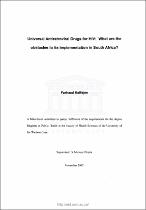| dc.description.abstract | Perhaps one of the most interesting and controversial debates occurring nationally at present is the one around HIV/AIDS and the cost, availability and supply of antiretrovirals (ARVs) in the public health sector. on the 8th August 2003, the cabinet instructed the Minister of Health to have a detailed operational plan in place and to begin some kind of an ARV roll-out by the end of September. At the time of writing this (November 2003), the plan was still awaiting cabinets approval.
It is the aim of this study to try and investigate what the obstacles to providing ARVs at different levels of government are. This study reviews the background literature on ARVs and its proven efficacies. Thereafter, the literature on patent laws and the Trade Related Aspects of Intellectual property Rights (TRIPS) as well as South Africa's negotiations at the World Trade organisation (WTO) with specific reference to generic ARVs are examined.
Some key informants have been interviewed to get a clearer understanding on the obstacles to universal ARV distribution. These include a negotiator from the South African Department of Trade and Industry (DTI), a representative from the Western Cape Provincial Department of Health, the head of the Medicines
Control Council (MCC) and an experimental and clinical pharmacologist. These interviews have been dissected and analysed so that all points of view are represented. This thesis suggests that areas of concern are, drug prices, human resources and importantly, political will. It also recommends that patient selection criteria be developed after proper consultation, human resources and staff training be addressed as part of a national strategy. Further conclusions include the sourcing of the cheapest possible prices for ARV drugs, ensuring a proper distribution strategy for the ARVs, as well as looking to other countries with experience for assistance. Finally, it examines using existing infrastructure such as the tuberculosis programmes as a basis for implementing the ARV programme and also considers implications the programme may have on equity within the health services. | en_US |

